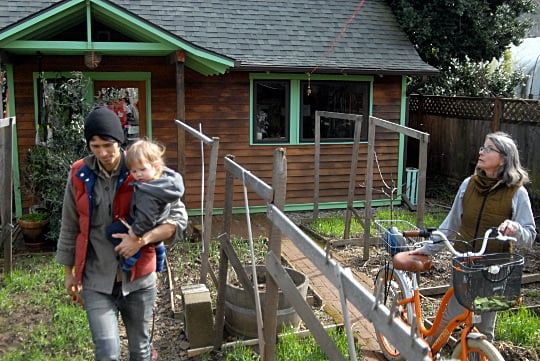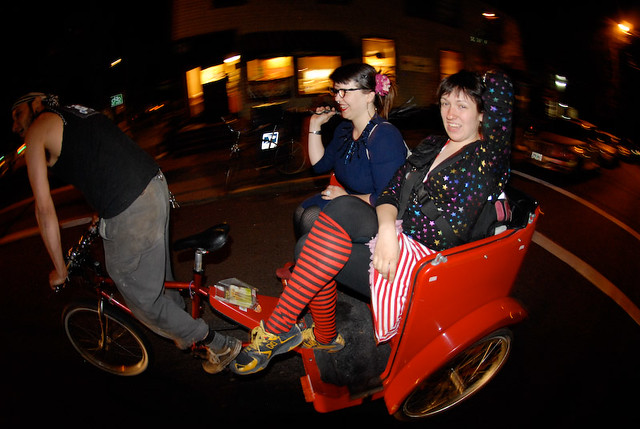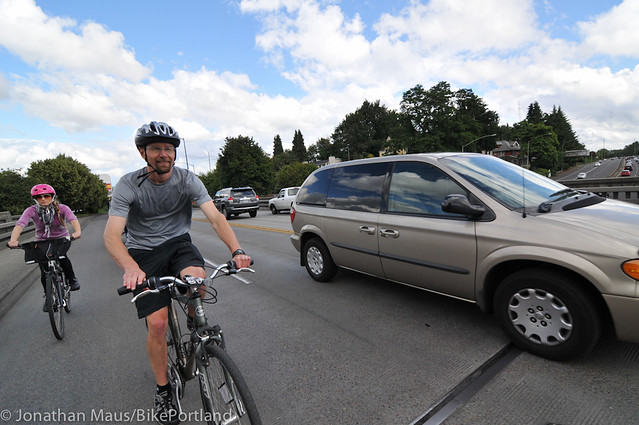A flurry of end-of-year activity at Portland City Hall Wednesday led to changes in three different stories we’ve been tracking on BikePortland.
With Commissioner Amanda Fritz playing a key role in all three votes, the council agreed to delay changes to pedicab rules that would have required pedicab operators to hold driver’s licenses and have a year of continuous driving experience; to require a one-time “defensive driving” training for taxi, Lyft and Uber workers rather than retrainings every two years; and to allow small accessory dwelling units to be built near the edge of properties as long as they’re no larger than the garages that have long been allowed near property lines.
“Worst of all is the appalling disregard in this ordinance for pedestrians, cyclists, and other motorists.”
— Amanda Fritz
Fritz and her colleagues Nick Fish and Dan Saltzman had pushed on Nov. 24 to postpone the effective date of new pedicab rules until the pedicab industry could confer with city staff. An amendment to this effect by Fish was approved unanimously then, and was (the city said) reflected in the code approved today.
On taxi safety, Fritz and Fish cast votes against the new rules, with Fritz citing “appalling disregard in this ordinance for pedestrians, cyclists, and other motorists injured” by drivers of Lyft, Uber and other so-called “transportation network companies.” The ordinance passed 3-2.
And on backyard homes, Fritz cast a lone vote against allowing garage-sized residences to be built without five-foot setbacks from property lines. She was outvoted 4-1.
Here’s what happened in a bit more detail:
Pedicabs
As we reported Nov. 18, Portland’s effort to rewrite its code for “private for-hire transportation” was prompted by the illegal arrival of Uber last spring. It resulted in the city hastily rewriting its rules for pedicabs without notifying local operators that it was doing so.
Among the proposed rules: pedicab operators would have been required to hold driver’s licenses and have “at least one year’s worth of continuous driving experience in a United States jurisdiction” before certification as a pedicab driver.
Even city staffers overseeing the code rewrite didn’t seem to be aware that this was what the code said. In this exchange with Fritz from a Nov. 24 hearing, Novick advisor Bryan Hockaday said “we did not intend to have any changes” for pedicab companies before conceding that apparently changes had been made.
Advertisement
Fritz, Fish and Saltzman persuaded the council to preserve the status quo for pedicabs and also for non-emergency medical transport companies, which are also covered but were not consulted about the rewrite.
Because of the difficulty of revising code on a tight deadline, the council left the proposed code language in place, but PBOT spokesman John Brady said in an email Wednesday that the council had included a clause saying that the new rules for pedicabs and NEMT companies didn’t apply.
Taxi, Lyft and Uber safety
As we reported Nov. 5, Portland’s new rules for taxis and transportation network companies require drivers to complete a “defensive driving” course. The city describes this requirement (which isn’t common on Uber or Lyft drivers around the country) as part of its Vision Zero effort.
But that provision will replace a stiffer one that currently applies to taxis.
“The problem is it’s a one-and-done training requirement, instead of the current mandate for taxi drivers to do a defensive driving course every two years,” Commissioner Fritz explained in an email Wednesday. “Also, the TNCs get to start driving then take the test in 30 days, despite testimony that more accidents happen when drivers are new.”
Fritz also took issue with the fact that the city requires only $50,000 of liability insurance coverage for TNC drivers when they are on their way to or from a job.
“I am baffled as to why any of you would consider your own life, or that of the person you love most in the entire world, to max out in value at $50,000, less than half of one year of our salaries,” said Fritz, whose husband was killed last year in a multi-vehicle collision on Interstate 5. The Mercury has the full text and video of her emotional address.
Fish voted with Fritz against the new rules. Transportation Commissioner Steve Novick voted for them but said he doesn’t think the $50,000 limit is acceptable but hopes to fight it in the state legislature instead of city council.
“Uber and Lyft have made it clear that if any jurisdiction tried to depart from this agreement, they intend to declare war,” Novick said. “If you’re going to pick a fight with a $50 billion company, you’re probably smart to look around for some allies. So I’m going to do that.”
Backyard homes

(Photo: M.Andersen/BikePortland)
As we reported Nov. 20, Fritz is not a fan of a proposal to remove a five-foot setback that applies to small homes but not to garages of the same size.
City code has long allowed structures to be built in R-7, R-5 and R-2.5 zones that are no more than 15 feet tall at the peak and 10 feet tall by 24 feet wide on any wall close to a property line, as long as they are “garages” designed to hold a motor vehicle.
A code change discussed for most of this year proposed to remove that special status for car storage, allowing structures like backyard rec rooms or large bike sheds in similar buildings. Fritz said she supported those uses but not another scenario: if the home included a bedroom and a kitchen sink, thus qualifying it as a detached accessory dwelling unit.
Fritz said she’d asked the people at two recent community meetings about the measure and “by a 20-1 margin people do not, in general, support this. I have given both arguments for and arguments against, as I read them in my emails, and did not state my own preference, and it was quite stunning how many people are quite concerned about this. And I believe that it’s going to have backlash against accessory dwelling units.”
She predicted “an explosion of these built as Airbnbs.”
Mayor Charlie Hales, the only other council member to comment on the issue, said he was “sensitive to the concerns” raised by Fritz but said there was “such demand for this kind of housing in the city that we should try to make this work.” He, Fish, Saltzman and Novick all voted for it.
— Michael Andersen, (503) 333-7824 – michael@bikeportland.org





